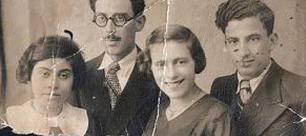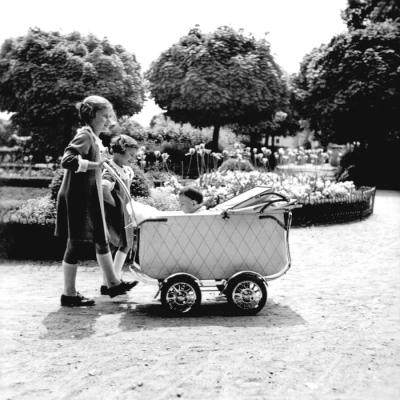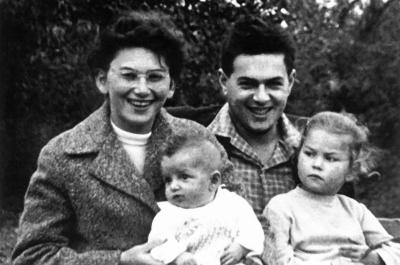From the Centropa Biographies - Dagmar Lieblova

Dagmar Lieblova
Born 1929 in Kutna Hora
Country: Czech Republic
City: Prague
Interviewer: Pavla Neuner
Year of interview: 2004

Dagmar Lieblova and her sister and cousin in 1937. Kutna Hora Czechoslovakia
We lived in Kutna Hora until we were deported to Terezin in the summer of 1942. At first, we had to go to the assembly point in Kolin, and then to Terezin. My father stayed in the Sudeten Barracks, while me and my mom, sister and grandmother were in the Hamburg Barracks. My sister then lived in the Kinderheim [children's home] and I was in house L- 410. Mom initially worked as a cleaner in the Kinderheim and then she got a job with the Menagedienst [food distribution service] in the kitchen of the Sappers Barracks. My father was employed as a doctor in the Jägerkaserne [Gamekeeper's Barracks], which was where the deportees from Germany were sent. The living conditions were fairly good, in comparison with the way things turned out.
We stayed in Terezin until December 1943. They took us away in closed cattle cars. We didn't know where we were going, but on the way we realized it was to the east. We arrived at night in Auschwitz. They took us straight away to a block inhabited by those who had come in September. Transports from September and December 1943 and May 1944 went to Family camp in Auschwitz without selection. They began tattooing numbers on our arms. That is when mom found out that her brother was no longer alive, which was our first shock. Then we left for the baths and I can remember someone saying: "Just come back safely." At the time, none of us understood what that was supposed to mean. After our bath we were given clothes, which were nothing but thin rags, hardly enough for us to keep warm in the December cold. I lived with my mom and sister in the same block.
One day we saw dad at roll- call, but we could hardly recognize him, for he had become terribly run- down in just a few days. Mom did what she could to help us, so she found work carrying out huge barrels of soup. The advantage was that those who distributed the soup could scrape what was left from the bottom of the barrel. But it was difficult work for mom, so she then stood guard over the toilet in the block which was for those who hadn't the strength to get to the outside latrine.
My father was a doctor in Terezin and when we arrived in Birkenau, he was told to see the chief physician who asked him if he had studied at a Czech or German university. My father was very patriotic, so naturally he said he had been to a Czech one. He was asked another two times but kept saying he had been to a Czech university. If he had said he had been to a German university, he could have been a doctor there as well, but he would never have said that. Instead, he had to go around checking the inmates to see if they had flees. In one way this was good for us because he could go to the women's blocks, so we could see him. Afterwards, I went to the children's block where I later looked after ten-year-old boys.
In 1944 we somehow suspected that there was little remaining time for us. I had a strange kind of feeling. I was fifteen and couldn't imagine that we would get out of it or, on the other hand, that it would all come to an end now. I can remember saying that I would never see trees or forests again, or go anywhere by train. We became alarmed when we saw two other transports arrive from Terezin. Then came news that all those fit to work would be sent off to work. Those fit to work meant women from sixteen to forty and men from sixteen to fifty. I was fifteen, my sister was twelve, dad was fifty-two and mom was forty- three. None of us fell into that group. But then the block leader came and read out the numbers of those who were to go through the selection process. My number was called out - 70788. I said it was a mistake, but it was on the records, so I had to go, which was lucky for me. I don't know who made the mistake, but it was a mistake that saved my life.
First of all, we were sent to the Frauenlager [German, female camp], where we stayed for a few days in terrible conditions. A few days later we were given our prison clothes and shoes and after a few selections they took away the last of us and loaded us onto trucks. It was a strange feeling, finally to be leaving Auschwitz. A few days later, we arrived in Hamburg, at the Dessauer side of the port. It was a July Thursday.
In September they sent us to Neugraben, which is a district on the outskirts of Hamburg. At first we were guarded by members of the Wehrmacht, who were later replaced by the SS, but they weren't too bad. They were then sent to the front and the next guards we had were old customs officers, some of whom were decent, others were not. Emergency accommodation was being built in Neugraben for those whose houses had been bombed out. We dug the foundations for these houses, as well as ditches for the water and electricity connections. We did this even when it was freezing and the ground was covered in ice.
Once we were working in a place where a lady with a twelve-year-old son was living. Her son always said a few words to us and his mom asked our guard if we could carry pieces of turf into her garden. She later invited us in and gave us black coffee and some bread and cheese. Before Christmas the boy brought us a large sack, saying that Weinachtsmann (Santa Claus) had brought it. Inside was a yellow turnip, cabbage and a few potatoes. For him it was nothing special, but for us it was a princely gift. We were then sent to clear away the snow in Harburg, where we dug out bricks from piles of debris. We then went to dig an anti-tank ditch around Hamburg. We were working alongside prisoners of war. In February we had to move again, this time to a quarter called Tiefstack, which was at the other end of town. I couldn't move, though, because I had a badly lacerated leg, so they took me, along with the other sick people, in a truck, so we didn't have to walk. We didn't have the customs officials as guards here. Instead we had SS-women who were worse. Once again we had to dig out bricks and clear the area for further use. One day we returned from work and our camp had been bombed out.
Some time later we were sent away from Hamburg. First of all we went to the railway station and then we went by train to Celle. That was at the end of March 1945. Several people managed to escape on the way. From the station in Celle we then went to the Bergen-Belsen concentration camp. It is hard to describe what it was like at that time. In the barracks that we went to, there was a bare floor where we had to sit as we were so crammed. The hygienic conditions were shocking, as there was no water or anything. Piles of dead bodies were lain everywhere between the blocks. A few days later the SS-men escaped because at that time you could hear cannon fire everywhere. There wasn't any food left at all. Me and my friend Dasa found a carrot in a pit and took it. Then, when it was impossible to endure much more, along came the British army on April 15. I didn't even have the strength to stand up to see what was happening. They brought some food, but me and Dasa only took a can and smeared the carrot with grease. There were people there who ate a lot of food very quickly and that was their end. There was an inconceivable amount of lice and flees. Makeshift bathrooms were put up to give us showers and to disinfect us. I later caught a high fever and had to stay in hospital until July 1945.
As soon as the war was over, I wrote home to Fanynka, at whose place we had hidden things before the war and who had send us packages throughout the war. People from Bergen-Belsen were supposed to go to Sweden for recovery, and I was to go there too. But just before setting off, I received news from a person who Fanynka had been with during the war. It was one of my father's friends and he wrote that they were awaiting my return.
The first train from this area was dispatched to Czechoslovakia in July 1945. We traveled by train through conquered Germany for almost a week and then arrived in Pilsen, where we had to get off as it was supposed to be the end of the American zone. They then put us in open coal trains and we went on to Prague. My dad's friend, the professor, found me in Prague and took me to Kutna Hora where our Fanynka also was. The next day they took me to see the doctor and it turned out that I had a very nasty affection of the lungs. The doctor arranged for me to stay in a sanatorium in Zamberk, where, as I later found out, the only reason they accepted me was to give a doctor's daughter a decent place to die. I stayed in the sanatorium for two and a half years, until February 1948. I was then given an apartment in our old house and returned home.
After returning home, I decided that I should study because I hadn't even finished my elementary school education.

Dagmar Lieblova with her husband and children in 1959. Kutna Hora Czechoslovak Socialist Republic
I have never forgotten that I am Jewish. My children, too, have always known. It has always been taken for granted in our family. My children were not brought up in a Jewish way, because I myself had not actually had such an upbringing, but they are very interested in Jewishness.
